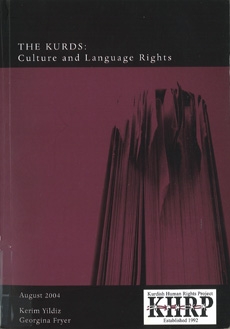
The Kurds: Culture and Language Rights
Kerim Yildiz
Georgina Fryer
KHRP
The Kurds are believed to be descendents of Indo-European peoples who settled amongst tribes living in the Zagros mountain range around four thousand years ago. Although the term ‘Kurdistan’ has never designated a Kurdish state, it has been used to describe this geographical area since the Turkish Saljuk Prince Saandjar created a province with this name in the twelfth century. The majority of Kurds still live in this area, which covers southern Turkey, northern Iraq, western Iran and northern Syria. There are currently around 24 - 27 million Kurds living in the Middle East today. Although the four states have refused to ascertain the size of their Kurdish population, scholars estimate there are 13 million Kurds in Turkey, 4.2 million in Iraq, 5.7 million in Iran and just over 1 million in Syria. As such Kurds constitute about 23 per cent of Turkey’s population, 23 per cent of Iraq’s, 10 per cent of Iran’s and just over 6 per cent of Syria’s.1 There are smaller Kurdish populations in Lebanon, Armenia and Azerbaijan, and the Kurdish diaspora can be found in Europe, Canada and Australia.
The mountains have both protected Kurdish culture from external threat and have also prevented its unification. The Kurds do not share a single common language but speak a number of different dialects. Kermanji is spoken by most northern Kurds and Sorani is spoken by most Kurds in the southeast. Subdialects include Kirmanshahi, Leki, Gurani and Zaza. In spite of this they have cultivated a cultural identity over two thousand years, of which their language remains the most crucial aspect.
For the second time in under a century, the fate of the Kurds has been subordinated to the aspirations of states which stake geopolitical claims to the territories in which they live. In the aftermath of World War I Kurdistan was divided between the four nation-states of Turkey, Iraq, Iran and Syria. As a large minority in each, the Kurds were perceived as a threat to internal and external security as their distinct identity, marked chiefly by language, could provide the basis for separatist movements and therefore had to be extirpated. Policies targeting aspects of Kurdish culture, especially its language, immediately ... | 